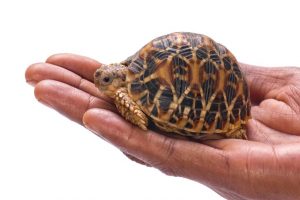
Reptiles show a disease first in behavioral changes: often the affected animal reduces the food intake or no longer eats at all. In addition, one can observe changes in the activity: the animal moves less or avoids certain movements. Sometimes it sleeps a lot or withdraws completely.
In addition, each species reacts in a manner that is characteristic for them: many lizards and snakes become more aggressive. In chameleons the skin color changes. Aquatic turtles lie with their eyes closed in the vicinity of the heat lamp, are less likely to enter the water or have problems with swimming and diving. Land turtles tend to bury themselves in disease. In snakes, symptoms such as moles or moistening problems can point to existing diseases.
In addition to these general symptoms, there are a large number of specific disease symptoms. These indicate the path to certain diseases. You will find all the information in our Symptom-Finder.
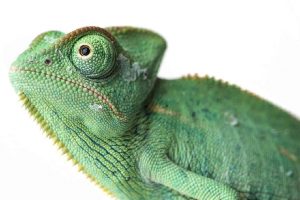
More than 90% of all reptile diseases are caused by suboptimal living conditions – this shows how important a proper animal welfare is for the health of our reptiles.
If an animal is already ill, usually only the veterinarian can help. In addition, however, a consequent improvement in posture conditions is indispensable – otherwise the disease can break out again.
The effort is rewarded with certainty because even minor improvements in posture can produce great effects.
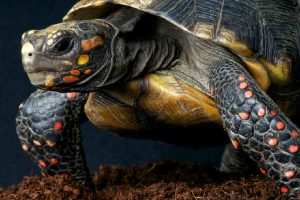
Common: kidney disease, gout, overweight, dehydration, rickets
Uncommon: liver disease, diarrhea, constipation, respiratory disease, coryza, parrot, urinary tract, urinary tract infections, bot skin infections, abscess, injury of the armor, skin and connective tissue injury, skin mycosis, armor infections, intestinel parasites, cloaca disease, joint disease, eye disease , Postchibernale sepsis, stomatitis, acute stress, food deficiency, emaciation, fatigue syndrome, herpes, URTD, irido virus, vitamin A overdose, vitamin D overdose, neoplasia
Typical postural deficiencies: over-supply with fat and protein, terrarium keeping, too dry attitude
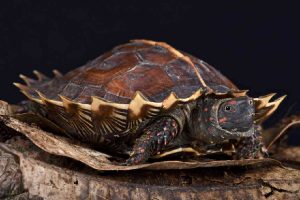
Common: liver disease, overweight, skin and connective tissue injury, abscess, armor infection, fetal
Uncommon: Bacterial skin infections, skin mycosis, diarrhea, respiratory disease, runny nose, oestrus, vitamin A deficiency, dyspneasia, ocular disease, rickets, constipation, injury to the armor, acute stressfulness, renal disease, urinary tract infection, joint disease, cloaca disease, stomatitis, gas bladder disease , Papillomatosis, nourishment, emaciation, fatigue syndrome, neoplasia, moistening problems, vitamin B1 deficiency, vitamin D overdose, vitamin E deficiency
Typical postural abnormalities: lack of warming, overfeeding, insufficient plant food, lack of soil (female).
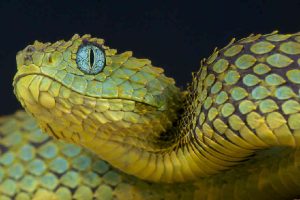
Common: Cropping problems, mites, bacterial skin infections, skin mycosis, stomatitis
Uncommon: Dehydration, Darmparasites, Abscess, Gastroenteritis, Eye disease, Respiratory system disease, Liver disease, Kidney disease, Constipation, Diarrhea, Amoebia, Cryptosporidia, Skin and connective tissue injury, Burns, Acute stress, Joint disease, Spondylosis, Cloccal disease, (IBD), URTD, vitamin B1 deficiency, vitamin D overdose, vitamin C deficiency, vitamin E deficiency, bladder disease, gas bladder disease
Typical postural disorders: Unhygienic posture, too dry
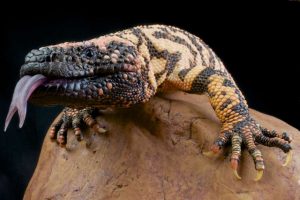
Common: liver disease, overweight, skin and connective tissue injury, wound infection, abscess
Uncommon: dehydration, kidney disease, gout, constipation, acute stress, dyspnoea, coccidia, cryptosporidia, bacterial skin infections, skin mycosis, urinary tract infection, stomatitis, respiratory disease, coryza, Rashitis, joint disease, spondylosis, papillomatosis, legend, food depletion, emaciation, fatigue syndrome, neoplasia, vitamin A overdose, vitamin D overdose, vitamin B1 deficiency, vitamin C deficiency, URTD
Typical postural deficiencies: overfeeding, too dry, too close socialization
http://www.reptiliendoktor.com/
Translation Heike Krüger, edit www.terraristik.cz